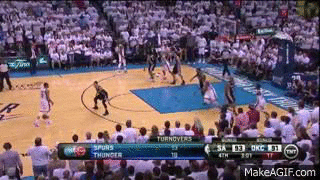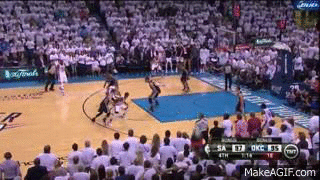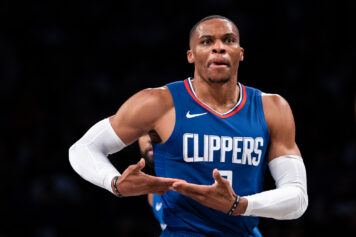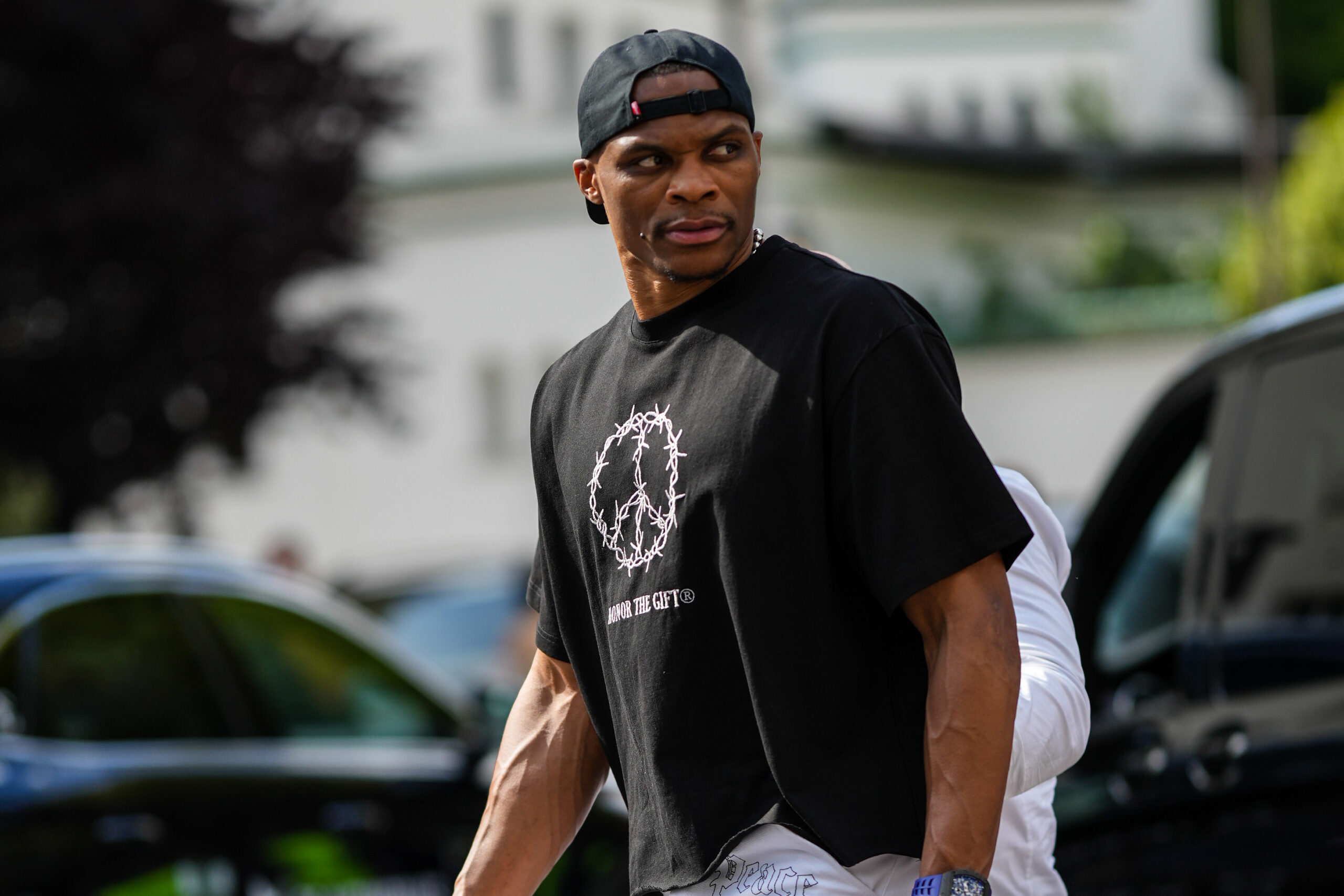Russell Westbrook is a cigarette of a point guard. He's an addictive 6-4 ball of flames to watch, but toxic to use in excess and comes packaged in a complicated reputation which includes a warning to your offense's health…. He needs a nicotine patch of a coach
He hurles himself forward at breakneck speeds and leaves behind a trail of exhaust flames on his jaunts to the rim. However, he can be oblivious to the whiplash inflicted on teammates by his no-holds-barred psychology.
One day you want to quit Westbrook because of how detrimental he is to Kevin Durant’s production and the Thunder’s bottom line.
The next day you’re jonesing for a light.
He matriculates through the lane with the lithe quickness of Peter Parker's Spiderman, but his lack of F’s to give about a game plan and ornery attitude is more comparable to Will Smith’s Hancock.
He’s a super athletic mass of kinetic energy that's half-inebriated off his own talent, driving down the lane with no disregard for the presence of mere mortals. However, even when his stat line is heroic, there is often collateral damage left in his wake. One second, he’s a beloved figure and the next, his head is on everyone's mental trading block.
Basketball coaches have a popular saying which Westbrook ignores that whittles down to, ‘Be quick, but don’t hurry’.
Westbrook runs the floor like an impatient curmudgeon who experiences the world in slow motion and tires of moving at a regular pace.
If you hurry through anything, you’ll miss the nuance. As physically gifted as Westbrook is, the byzantine aspects of being the floor general escape him. His internal compass guides him to explode towards the rim like a heat-seeking missile, but Westbrook displays the tactical prowess of a tic-tac-toe novice.
Westbrook’s fly by the seat of his pants tendencies makes his partnership with Durant that much more unique.
Durant is the picture of efficiency for a wing scorer, who went so far as to employ a personal statistician to help him identify his strengths and weaknesses. The pair have had their quarrels, however, there are enough dissertations on their complicated relationship to fill a library.
Scott Brooks and Westbrook’s synergy is rarely examined.
Westbrook’s Tasmanian devil routine is supplemented by Scott Brooks’ abstract offense that implores his scorers to go off on their own shot-creating tangents. Westbrook and Durant were Nos. 1 and 2 in usage rate during the regular season—in that order. Not a single player handled the rock more often than Westbrook during the regular season.
Westbrook has been ranked in the top three of usage rate leaders during each of the past four seasons while Durant was given a more substantive ball handling role in Westbrook’s absence which hoisted him to second.
Perhaps that free reign is why Westbrook is so defensive of Brooks, who was a prolific scoring point guard at UC-Irvine in another life, and why Westbrook refers to Brooks as his most steadfast champion. Brooks is the only person, Westbrook gives a pass.
Manu Ginobili is the best case scenario for a daredevil spirit that blended into a strict environment. However, Westbrook’s duties as the team’s primary ball handler make him more difficult to bench. Westbrook can be a braggart liable to yank the carpet out from underneath himself Prince Oberyn-style and hurt his own cause.
In the Thunder’s season finale, Westbrook molded a 30-point, 5-rebound, 5-assist sculpture with his bare hands for the second time. Westbrook only shares living space with Michael Jordan in that hallowed penthouse box score. Unfortunately, it also came at a steep price of 8-23 shooting from the field and seven turnovers.


The Thunder need less of a Marlboro pack a day point guard and more of a Cuban cigar floor leader that picks his spots more judicially by slapping a nicotine patch on his shoot-first, ask questions later tendencies and defer to the league's most gifted natural scorer.
Yet, as popular as it is to blame Westbrook for the loss to San Antonio, it’s too simplistic. He was also nearly the anti-hero down the stretch for Oklahoma City before the team ran out of gas.On the tertiary end of that figure is Westbrook’s 17-for-18 free throw shooting. Westbrook’s court volatility can be traced to the Thunder’s system or lack thereof. Whether it’s a causation or correlation is a question only Brooks can answer.
To define Brooks' place in the coaching hierarchy, let’s take a peek at the six basic blanket categories that nearly every coach fits into.
1. Cal Naughtons– Much like Ricky Bobby’s racing partner of the same name, these coaches are pit crewmen lapelled to heralded head coaches who do all the grunt work without getting much of the credit. Their muted personalities and specialized knowledge often make them more suited to be career assistants. Their names are rarely uttered by anyone besides the most ardent local fans. Examples include: Tex Winters, Jim Cleamons, Kurt Rambis, Jonathan Nolan.
2. The Expendables – These are the generic coaches destined to be just a cog in the machine. They’ll be spit out and chewed up on repeat on the coaching hamster wheel for the next decade if they’re lucky. Nobody’s sure why they’re consistently being hired by bad teams, but they stay employed. Presumably, it’s to offer cover for tanking.
3. Olivia Pope’s Gladiators– These guys are essentially change of pace hires brought in to fix a specific problematic component of a team. Everything the previous head coach represented is treated as the opposite of what they seek in a replacement’s dominant leadership and strategic traits. It’s common practice around the league for player’s coaches who struggled to foster discipline to be replaced with rigid authoritarians. Offensive gurus get swapped out for grind it out, defensive stalwarts (Mike Fratello to Lionel Hollins, Don Nelson to Jeff Van Gundy, Mike D’Antoni to Mike Woodson Jim O’Brien to Frank Vogel).
4. Vestigial Coaches– The coaches tasked with guiding young teams to the next stage in their evolution, but eventually they become overwhelmed when the job’s growing expectations develop into one that exceeds their capabilities. As a result, they hit a wall and become vestigial bench tailbones that outstay their usefulness. They also lack a certain panache for the intricacies of in-game adjustments and instead of being proactive in their strategies these queen’s guardsmen survive by going through the motions and try not to screw things up. Vinny del Negro is the current valedictorian of this regal class, replacing Mike Brown atop the totem pole.
During del Negro’s two previous stints as an NBA head coach with Chicago and L.A.’s junior franchise, he was charged with elevating two of the league’s most promising point guards to their career apexes. You could argue that he deserved one more season with the Bulls’, but there’s no denying that Tom Thibodeau and Doc Rivers were craftier managers of the talent available at their disposal.
5. Kweli Class –
If skills sold, truth be told, I'd probably be
Lyrically Talib Kweli
Truthfully I wanna rhyme like Common Sense
But I did 5 mill' – I ain't been rhyming like Common since –Jay Z, Moment of Clarity
This category of coaches are Kwelis of the coaching grind. These coaches possess the grassroots basketball cred, but lack the postseason bling to accompany their legacies partly because they weren’t fortunate enough to be blessed with multiple Hall of Famers. Yet, they did coach one or two extraordinary teams. In 20 years, we’ll still be exaggerating the tales of their spectacular coaching feats.
A few of these coaches have won a title, however, they’ve also been fired at least once or are on the verge which docks them a few NBA2K24 Legacy points.
Examples: Rick Carlisle, George Karl, Tom Thibodeau, Stan Van Gundy, Larry Bird
6. Deus ex machina coaches: In storytelling, god from the machine is the plot device in which a seemingly impossible conundrum is resolved by the intervention of a divine event, character or object which defies previously established boundaries.
Although a title isn’t always necessary and vice versa, the highest distinction in the order is usually reserved for championship ring hawking coaches. The mere presence of this coach guarantees a 20 percent win increase during his first season. A title also doesn’t automatically vault one into this upper echelon either. They are Don Draper-like pitchmen who possess unparalleled influence and basketball intellect. On their own, they make Gatorade out of water and can transform pedestrian rosters into formidable playoff sharks. When given actual elite talent, these men are the equivalent of putting Christopher Nolan in charge of the Batman franchise.
These are the coaches, who would latch onto a team like Oklahoma City and create a dynastic team.
Examples include: Chuck Daley, Larry Brown, Gregg Popovich, Phil Jackson, Pat Riley, Doc Rivers and 2014 inductee: Eric Spoelstra.
The growing concern is that Brooks is Vinny del Negro without the professionally manicured 1980s Miami Vice dew.
Westbrook at least requires the structure of a clipboard cartographer such as Jeff Van Gundy or Kevin Ollie to rein him in. Kevin Durant is usually put in the same iso position to score 20 feet away from the basket behind a picket fence of defenders that Mike Brown used to put LeBron James in.
Now contrast that with Popovich shooting fish in a barrel by routinely running ball screens that resulted in Derek Fisher defending Tim Duncan underneath the iron halo.
This is Durant’s team, but Brooks has never displayed the type of gravitas or acumen necessary to rein in Westbrook. Durant will thrive no matter who the head coach is, but Westbrook requires maintenance.
The Thunder have the work cut out for them this offseason, but the most transparent improvement they can make starts at the top and should eventually trickle down to the critical elements of his roster.
Seasons of fifty wins don’t guarantee job security. Ask Mark Jackson or Rick Carlisle in Detroit circa 2003. The expectations grow as the wins pile up.
High risk, high reward professions come with a price. As often as we pose hypothetical trade scenarios for Westbrook, Brooks has been getting a pass for too long. Mark Jackson's dismissal from Golden State amid a slew of controversies was highly publicized, but the concerns over his iso-heavy offenses were a tangible concern for the Warriors front office. Once their first options didn't pan out, the offense would break down into an iso-show for the other four offensive players, resulting in dumpster shot possessions. As a result, the Warriors passed the ball fewer than any other team in the league. About 90 fewer times per game than San Antonio and 50 fewer per examples of quality ball movement per contest than the Heat. The Thunder were 26th. Prior to this season, in which Westbrook was limited to 46 games and committed the highest turnover rate of his career, they'd turned the ball over at one of the league's worst rates since the 2011-2012 campaign.
There were 24 plays in which Oklahoma City didn't even pass the ball once during Game 6 and for the series Oklahoma City passed the ball 519 more times. It’s not just Westbrook improvising out there. The rampant turnovers were slashed this season, but the Thunder remained one of the stingiest teams in the league where one dribbler pounds the air out of the rock while four spectators watch. It stood in stark contrast to the generous passing promoted by the Spurs flowing motion offense.
The half court offenses on display in Game 6 illustrated the disparity in offensive philosophies—if you think OKC’s whimsical approach attack represents order of any kind—between Popovich and Brooks. On 100 totalhalf court plays, the Thunder passed the rock 137 times. On 105 offensive possessions, the Spurs disseminated the ball around 288 times in the halfcourt.
This wasn’t a fluke. It’s been Oklahoma City’s M.O. for most of the past five seasons. Their offense is a Vegas crapshooter’s dream. Westbrook’s defensive gambles led to many of the Thunder’s transition dunks. However, they can also leave him bankrupted when he whiffs and is left out of position. Over time, those mistakes pile up like carbon monoxide in the lungs and can leave the Thunder coughing up points.
The Thunder are limited by their roster by what type of maneuvers they can expect to make, but they can control how the roster they do have at their disposal is utilized.
We don’t judge Westbrook through a simple prism of wins and losses, but rather on a basis of his oscillations between dangerously erratic and clutch playmaker. Brooks should be judged under the same criteria. Brooks may not be a bad coach but he’s not a great one. The Thunder deserve to appoint one that is capable of meeting the raised expectations for Durant and Westbrook’s sake.
The Thunder are a team populated with a pair of superstar scorers, a defensive paint protector with an expanding offensive game and an above average supporting cast. Unfortunately, they’re also employing a Peter Principle head coach, who has reached his peak.
Westbrook’s compulsive attempts to test the limits of team basketball leave the Thunder in a constant state of anxiety. No one would fault Brooks if he took up smoking to deal with the stress.
An upgrade at head coach can’t completely tame the hazardous elements of Westbrook’s game, but he can filter out the systemic issues that have given the Thunder’s All-Star point guard liberties to get buckets or die tryin'.
The early offseason leaves the Thunder and its roster in a state of flux. There’s no reason to make drastic changes to the starting lineup, but the bench requires a renovation. They can get around to reshaping the rotation eventually, but first they need to start with disposing of the flawed team custodian that enables Westbrook’s wild side.



